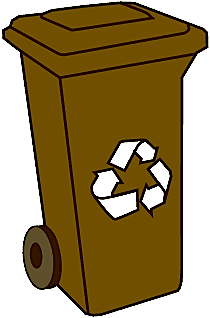What to compost
Do compost:
-
Kitchen:
- Newspapers, card (not glossy), paper towels
- Stale bread
- Pasta
- Egg shells and cartons
- Uncooked vegetable and fruit peelings and scraps
- Tea bags and coffee grounds / filters
- Cut flowers Garden:
- Straw, hay, sawdust and wood shavings
- Hedge trimmings and grass clippings
- Leaves
- Livestock manure
- Other vegetarian animal waste
- Young or perennial weeds
- Bedding plants
- Wood ash
Don't compost:
- Diseased plants
- Cooked food, especially meat fish or dairy products
- Pernicious weeds
- Pet droppings
- Coal ash / coke
- Disposable nappies
- Glossy paper and card
Different types of rubbish compost at different rates. Some items rot quickly and therefore can be used as activators to get the composting process started. However, if left on their own they will rot too quickly, leaving a decaying mess.
Other materials are slower to rot, which makes them useful for making the body of the compost pile. However, without the "hotter" activators, these materials would take a good long time to decompose.
So, to get the most out of your compost, a mix of 'hot' and 'cold' materials is most effective.
'Hot-rotting', fast burning activators include: comfrey leaves, young weeds, grass cuttings, chicken and pigeon manure.
'Cold-rotting', slow-cookers include: autumn leaves, tough hedge clippings, woody prunings, sawdust and wood shavings.
It is also a good idea to make sure you have a good mix of carbon to nitrogen waste (browns to greens):
Brown materials are high in carbon. Examples: dried flowers, woody stems and cardboard.
Green materials are high in nitrogen. Examples: fresh grass cuttings and kitchen waste.
Benefits of composting
-
Personal:
- Composting at home avoids the need to buy commercial peat-based composts from garden centres, which saves you money.
- Home compost can help produce healthier plants which are more resistant to pests and diseases and therefore reduces the need for chemical pesticides.
- Home compost provides most of the nutrients needed for plant-life, which reduces the need for the chemical fertilisers.
- Adding compost to clay soil makes the soil drain better.
- Adding compost to sandy soils can help the soil retain more moisture.
-
Environmental:
- Most of the commercially produced composts are peat based, so using your own compost reduces the demand for peat extracted from peat bogs. This is good because many peat bogs contain rare and endangered species, who are being caused irreversible loss and damage by this extraction.
- Composting organic waste stops it from being deposited in landfill sites. In a landfill site, organic waste is broken down and forms a liquid (leachate), which can escape from the landfill site and pollute the environment.
How to compost and other general tips
- Never use pesticides on your compost.
- Provide some moisture to your compost but don't allow it to get water-logged.
- Build air into the compost by forking the heap every so often.
- Cover the heap to protect from the rain and heat loss.
- Place the composter on the ground to allow worms to enter but place a wire mesh under to stop larger animals.
- If the mixture becomes wet and heavy, add in leaves.
- If in a large quantity it is better to recycle newspapers than to compost them.
- To speed up the process:
- Add lots of material at once. The more you put in, the faster the process will be.
- Shred and chop up larger items.
- Add in a handful of soil or finished compost.
- Add other accelerators, like nettles or other "hot rotters".
- You don't need any special equipment for composting except a fork. A compost bin keeps everything neater but is not essential.
- Compost is safe to handle, provided you keep to general gardening hygiene rules, such as keeping cuts covered, washing hands before eating and keeping your anti-tetanus protection up to date.
- Compost is made up by a host of small and microscopic creatures. These are not pests and will not overrun your garden.
- Compost is ready when it resembles dark soil and has a sweet earthy smell. It can take anywhere between two months and two years.
For more tips on composting your garden waste, see gardenorganic.org.uk.
The information on this page was gathered from the following sources:
South Oxfordshire District Council: 1, 2, Garden Organic: 1, 2, The Composting Association: 1

